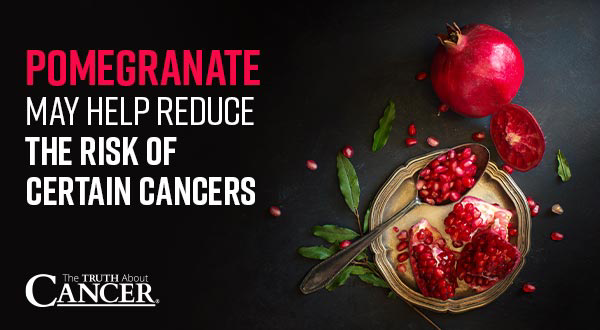A review conducted to explore the anti-cancer properties of pomegranate has found sufficient evidence that supports its use for the prevention of certain cancers.
The review looked at cell culture and animal studies, as well as human clinical trials on the use of pomegranate against certain types of cancers. After compiling and analyzing all the data, the team confirmed that pomegranate could help reduce the risk of breast, prostate, lung, colon and skin cancers, as well as hepatocellular carcinoma.
According to the review, pomegranates are good sources of antioxidants, phenolic acids and flavonoids. Just the peel of the fruit is rich in ellagitannins, ellagic acid, gallic acid, hydroxybenzoic acids and punicalagin.
The researchers said these compounds contribute to the plant’s anti-inflammatory, anti-proliferative, antioxidant and anti-tumorigenic properties. The team added that in the studies they’ve analyzed, pomegranates were able to modulate multiple signaling pathways used by cancer cells.
The team also discovered that the polyphenols present in pomegranates exhibited anti-carcinogenic effects in in vitro and in vivo experiments. Moreover, in animal studies, pomegranate extract showed the ability to inhibit the growth of lung, skin, colon and prostate cancer tumors. Meanwhile, in studies that involved human patients, punicalagin was discovered to have chemopreventive and chemotherapeutic properties against cancer cells.
“The therapeutic potential of pomegranate appears to be wide variety. So, leading to enhanced popularity as a natural compound and functional food for centuries. The pomegranate polyphenol; punicalagin, is known to have potent anticancer activity in breast, lung, and cervical cells,” the researchers wrote.
Different parts of pomegranate are beneficial
In addition, in the studies they’ve reviewed, some parts of the pomegranate plant (i.e., peel, juice and oil) have shown the ability to inhibit tumor cell proliferation, cell cycle progression and angiogenesis — the formation of new blood vessels — in different types of cancers.
Pomegranate peels, as mentioned, are rich in flavonoids and antioxidants, which were found to help delay the proliferation of different cancer cells. Aside from suppressing cancer growth, the peel can also be used to get rid of acne, pimples, rashes and wrinkles, as it is a natural skin moisturizer. Moreover, it can be used as a sunscreen and as a natural remedy for dandruff and hair loss. The peel may also help relieve sore throat, improve dental hygiene, boost bone health and improve gut health.
Meanwhile, pomegranate juice is rich in antioxidants, vitamin C, vitamin E, vitamin K, folate and potassium. It also has antiviral and anti-inflammatory properties. The juice may help improve digestion, relieve inflammation caused by arthritis, promote heart health, lower blood pressure, improve learning and memory, enhance sexual performance and fertility, support physical endurance and lower blood sugar levels. According to the researchers, the juice also contains ellagic acid, which may be the reason behind the anti-carcinogenic effects of the juice.
On the other hand, pomegranate oil is rich in vitamins C and K, as well as the antioxidant punicic acid, giving it the ability to reverse the aging, fight inflammation, fade scars, brighten the skin and protect against damage caused by too much exposure to sunlight. (Related: The potential therapeutic uses of pomegranate seed oil.)
“In view of the different activities of pomegranate extracts, we believe that they are suitable further investigations as potential multiple target-oriented therapy and prevention and suppression for the wide variety of cancer and its pathological outcomes. It is hoped that the present review will provide some worthwhile clues for continues explorations of this most attractive botanical species,” wrote the researchers.


















Doctors treat symptoms, but only rarely do doctors even try to look for the cause. No cures can be activted, until one eliminates the cause. Pomegranites may be a good source of nutitents, but people need to eliminate the causes of disease first. Many keep on eating the foods that contribute to the disease or continue lifestyles that foster disease…and expect a certain food to bring about the end of their problem? In 1976, I developed a rapidly growing tumor, after I went to a nutritional doctor who told me to eat a lot of a certain food. Well I heeded his advice and developed a tumor. Two doctors told me that if I didn’t have an immediate operation they would not give me any guarantees. I opted for prayer…and was guided to stop the food, which I had been told to eat. In less than 3 months the tumor dissipated and was gone. This was 44 years ago. Twelve years after, this occurred. I developed a tumor on my chest; nasty looking with spikes coming out. Iasked for guidance and removed a specific food from my diet. In a short period of time it dissolved and there was only a little pink spot on my chest. The wrong food is a major probelem. It must be removed, before any healing can occur.
I just love pomegranites. I eat them in the winter and they taste so good.